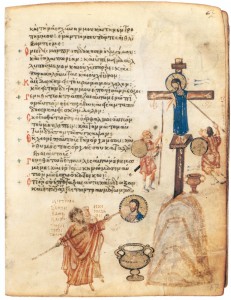by St. Augustine of Hippo
 The most skillful interpreter of the sacred writings, then, will be he who in the first place has read them all and retained them in his knowledge, if not yet with full understanding, still with such knowledge as reading gives, — those of them, at least, that are called canonical. For he will read the others with greater safety when built up in the belief of the truth, so that they will not take first possession of a weak mind, nor, cheating it with dangerous falsehoods and delusions, fill it with prejudices adverse to a sound understanding.
The most skillful interpreter of the sacred writings, then, will be he who in the first place has read them all and retained them in his knowledge, if not yet with full understanding, still with such knowledge as reading gives, — those of them, at least, that are called canonical. For he will read the others with greater safety when built up in the belief of the truth, so that they will not take first possession of a weak mind, nor, cheating it with dangerous falsehoods and delusions, fill it with prejudices adverse to a sound understanding.
Now, in regard to the canonical Scriptures, he must follow the judgment of the greater number of catholic churches; and among these, of course, a high place must be given to such as have been thought worthy to be the seat of an apostle and to receive epistles.
Accordingly, among the canonical Scriptures he will judge according to the following standard: to prefer those that are received by all the catholic churches to those which some do not receive. Among those, again, which are not received by all, he will prefer such as have the sanction of the greater number and those of greater authority, to such as are held by the smaller number and those of less authority. If, however, he shall find that some books are held by the greater number of churches, and others by the churches of greater authority (though this is not a very likely thing to happen), I think that in such a case the authority on the two sides is to be looked upon as equal.
Now the whole canon of Scripture on which we say this judgment is to be exercised, is contained in the following books: — Five books of Moses, that is, Genesis, Exodus, Leviticus, Numbers, Deuteronomy; one book of Joshua the son of Nun; one of Judges; one short book called Ruth, which seems rather to belong to the beginning of Kings; next, four books of Kings, and two of Chronicles— these last not following one another, but running parallel, so to speak, and going over the same ground. The books now mentioned are history, which contains a connected narrative of the times, and follows the order of the events. There are other books which seem to follow no regular order, and are connected neither with the order of the preceding books nor with one another, such as Job, and Tobias, and Esther, and Judith, and the two books of Maccabees, and the two of Ezra, which last look more like a sequel to the continuous regular history which terminates with the books of Kings and Chronicles.
Next are the Prophets, in which there is one book of the Psalms of David; and three books of Solomon, viz., Proverbs, Song of Songs, and Ecclesiastes. For two books, one called Wisdom and the other Ecclesiasticus, are ascribed to Solomon from a certain resemblance of style, but the most likely opinion is that they were written by Jesus the son of Sirach. Still they are to be reckoned among the prophetical books, since they have attained recognition as being authoritative.
The remainder are the books which are strictly called the Prophets: twelve separate books of the prophets which are connected with one another, and having never been disjoined, are reckoned as one book; the names of these prophets are as follows: — Hosea, Joel, Amos, Obadiah, Jonah, Micah, Nahum, Habakkuk Zephaniah, Haggai, Zechariah, Malachi; then there are the four greater prophets, Isaiah, Jeremiah, Daniel, Ezekiel. The authority of the Old Testament is contained within the limits of these forty-four books.
That of the New Testament, again, is contained within the following: — Four books of the Gospel, according to Matthew, according to Mark, according to Luke, according to John; fourteen epistles of the Apostle Paul — one to the Romans, two to the Corinthians, one to the Galatians, to the Ephesians, to the Philippians, two to the Thessalonians, one to the Colossians, two to Timothy, one to Titus, to Philemon, to the Hebrews: two of Peter; three of John; one of Jude; and one of James; one book of the Acts of the Apostles; and one of the Revelation of John. (On Christian Doctrine Bk. 2.8)
